10 Important Documents for Small Businesses Every Business Owner Must Have in 2025

What small business documents should you keep?
The quality of your document management workflow affects your revenue.
When recording keeping is poor, it becomes very challenging to understand your small business’s health and identify opportunities for improvement.
An EJBM study revealed that 89% of small businesses are conscious about good record keeping. This is because they regard it as a massive success factor.
So if you’d like to improve your likelihood of success, it’s crucial to figure out important documents for small businesses to create & preserve. These will give you a better understanding of vital processes so that you can improve revenue and increase growth.
Maintaining the right records will also enable you to strengthen your competitive positioning and improve regulatory compliance in your industry.
If you’d like to stay competitive by keeping up with the latest trends, check out this article I wrote on document management statistics for improving your processes.
In this article, we’ll discuss important documents for small businesses that you should keep in order to accelerate efficiency and improve success for your startup.
Let’s get started.
1. Business plan
Do you have a business plan to guide you?
This is one of the most important documents for small businesses because it helps to outline the path to success by creating a roadmap filled with strategies and goals.
The absence of a great business plan makes it difficult to secure funding and source capital for your small business, which gets in the way of growth.
A study by Liveplan revealed 65% of successful businesses have a formal and well documented business plan. Furthermore, it established that businesses with a plan tend to grow faster than those without.
So if you want to position your small business for success, you need an excellent business plan.
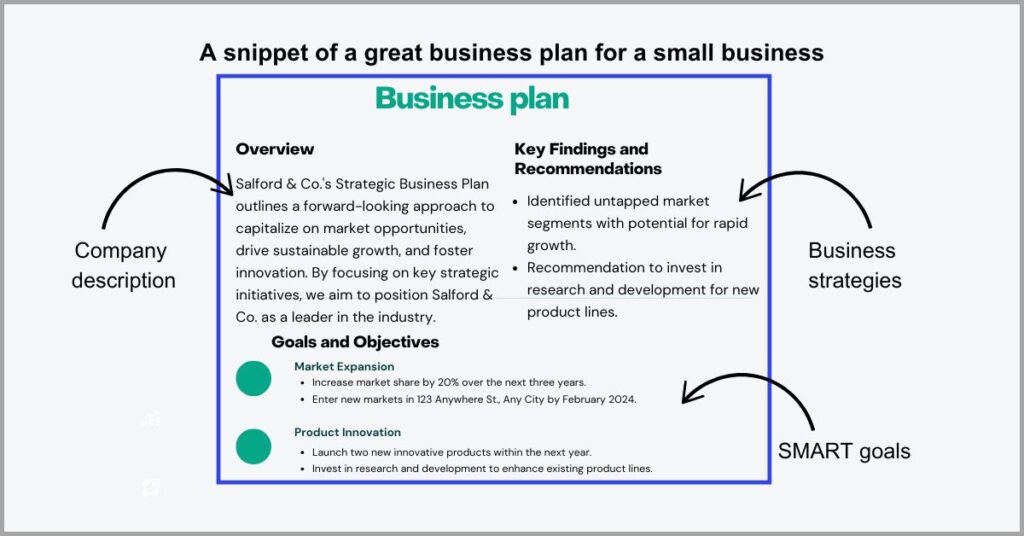
That said, a great business plan should have a few important sections, including the description of your company and executive summary. This outlines the market you’re targeting and what products or services you offer.
It should also describe your market strategies, financial budget and your unique selling proposition that sets you apart from other competitors in the field.
Additionally, it can contain bookkeeping strategies for your small business as well, that can help you improve cash flow management.
While each business plan varies depending on the nature of your product and services, it’s important to ensure that it contains goals that are specific, measurable, attainable, realistic & time-bound goals, which can help you focus your efforts.
2. Financial records
Cash flow management also influences success.
When this process is poor, it can create a myriad of consequences, including delayed vendor payments and missed growth opportunities that only hold back your business.
Worse yet, poor financial record keeping also increases the risk of debt, and can ultimately result in catastrophic failure for your small business.
It’s very alarming to note that 38% of startups failed because of poor cash flow management, according to a study by CB Insights. This made it the leading cause of business failure, eclipsing other reasons like regulatory challenges & stiff competition.
It’s therefore very crucial to maintain important documents for small businesses like financial records that depict your financial health.
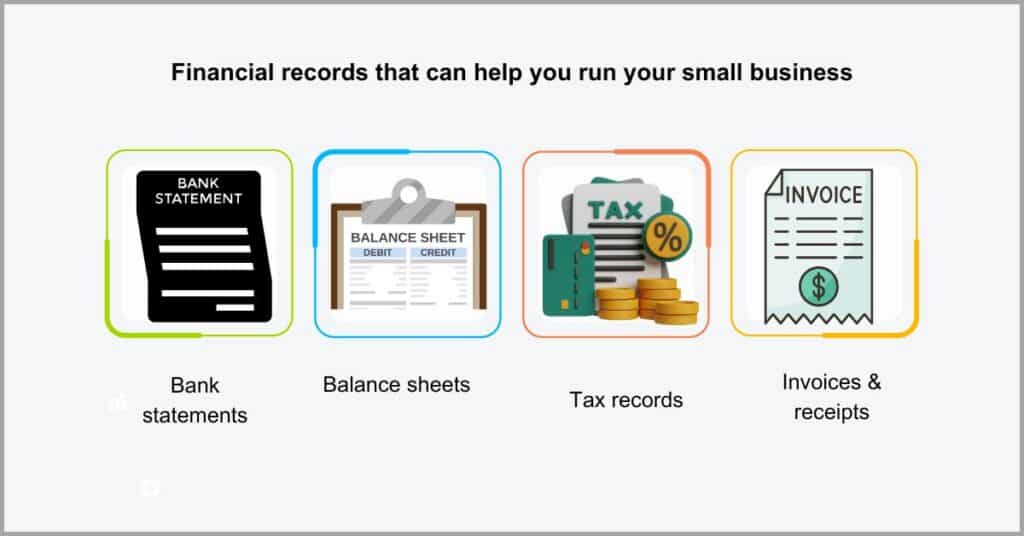
So what financial records should you keep?
Some of those include cash flow statements that help you track the outflow and inflow of cash for your business. You should also draft balance sheets, profit and loss statements and tax returns form.
That said, maintaining financial records in paper form increases the risk of document loss which is why I recommend a digital document management tool to create backups.
Click here to start your free FileCenter trial to digitize your documents.
With our software, you can create digital copies of important financial records and store them in the cloud to safeguard against document loss and improve accessibility.
3. Employment contracts
Why are staff contracts important for your small business?
For one, they define the terms of employment between your small business and its employees, setting ground rules, expectations, and obligations for both parties.
Working without contracts is unideal and makes you susceptible to spontaneous employee exits, while it also leads to poor role clarity that lowers productivity.
Unfortunately, nearly 5 in 10 employees lack role clarity, according to a study by Effectory. A great reason behind this is the lack of formal documentation that assigns official roles and responsibilities to workers.
When this happens, your small business can experience huge productivity losses that subtract from your bottom line.
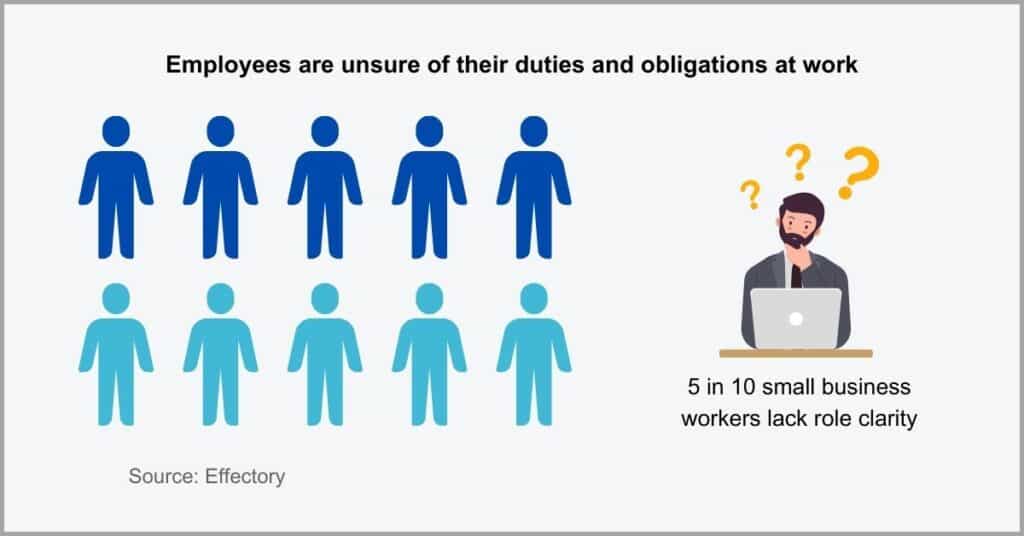
With well-executed contract management processes, you can maximize worker output by defining work activities. You’ll also protect your business from legal and regulatory issues by defining liabilities.
In terms of what to include in employment contracts, a well detailed job description is top of the list and it should define the job title and skill requirements.
Other important details also include compensation and benefits, which can help attract new talents. Time off policies should also be clear and detailed in the contract to reduce cases of unsanctioned absenteeism.
That said, employment laws are different across jurisdictions, so it’s essential to consult with local authorities to determine what to include in your employee contract.
4. Change management plan
So what is a change management plan?
A change management plan is a formal document that defines the procedures, tasks and strategies for managing change in your small business. This change can be in the form of a new technology project or adjustments to company policies.
If you run your small business without a concrete and formalized plan for handling change, the risk of change projects failing massively increases.
A ResearchGate study revealed that 70% of change initiatives fail, with one of the leading reasons being poor change management documentation. This reinforces the need for an elaborate and formalized strategy that can help you avoid failure.
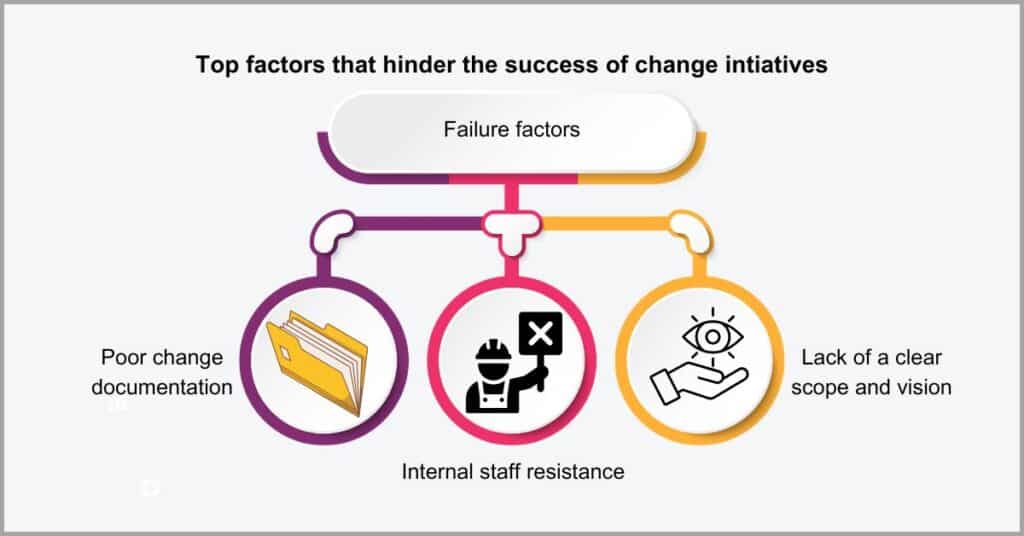
Fortunately, some of the best document management tools offer ready templates for various important documents for small businesses. So you don’t have to draft change management documents or other files from scratch.
When creating your change management plan, you need to first define the scope of the change to avoid scope creep. You should also identify key stakeholders and assign responsibilities to personnel to ensure accountability for the project.
Additionally, you should also create a timeline and describe clear goals of the change.
It’s also just as important to regularly measure the impact of this change via customer or employee surveys, among other tactics, so that you can course correct accordingly.
5. Customer documents
Customers are your business’s primary source of revenue.
So it’s only natural that you should keep important documents about your customers, which contain information about their purchase patterns, contact data and information about how they interact with your business.
That said, not maintaining up-to-date customer records can lead to poor understanding of your clients, and missed business opportunities.
A survey by Khoros revealed that 68% of customers said they’d spend more money on a brand that understands and treats them as individuals. It’s a testament to the power of personalized experiences.
However, in order for that to happen, you need customer records to provide the data you need.

But it’s more than just about improving sales.
Storing, maintaining and protecting up-to-date customer records is also an important part of improving regulatory compliance, which is another reason I recommend that you use the best paperless document management solutions to help you out.
These feature advanced security controls that prevent unauthorized access to sensitive customer information, while also protecting the data from various cyber security threats.
You can even retract information in customer records, which ensures that client details remain confidential in the event of a security breach.Furthermore, they may also offer dedicated and secure customer portals for sharing files and information with clients.
6. Business minutes documents
Do you document minutes during business meetings?
Minutes offer an official record that helps you keep track of action items, decisions and general discussions. They are one of the most important documents for small businesses that you should archive to improve accountability.
If you don’t keep a formal account of what transpired during meetings, your small business may have a hard time referencing ideas and enforcing agreed decisions.
Alarmingly, more than 71% of meetings are inefficient and unproductive, according to a survey by the Harvard Business Review. While several factors are to blame, no doubt, failing to document minutes is a key contributor to many unsuccessful meetings.
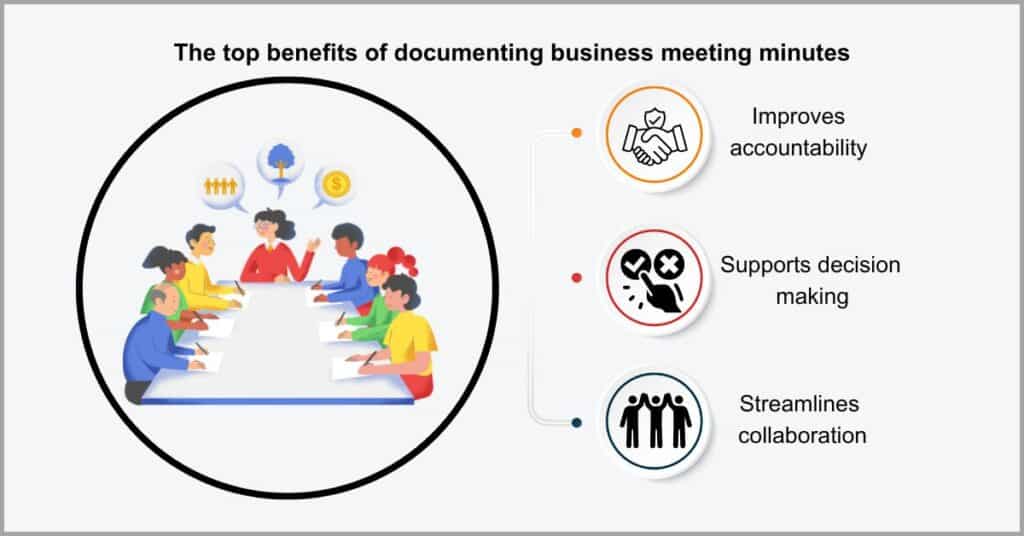
In order to make the most of business meetings, it’s therefore crucial to create minute documents that keep track of agenda items, action items and more.
That said, manually writing down minutes can be exhausting while it also opens the doors for human error. So I recommend using meeting minutes software to help you record, achieve and share minutes more efficiently with other staff.
You should also consider leveraging the best Revver DMS alternatives, which can help you scan and digitize paper recordings of business minutes to improve efficiency.
These tools enable you to enhance document searchability & improve decision making and accountability, helping you extract more value out of every business meeting.
7. Intellectual property documents
Written intellectual property (IP) documents are vital.
They help prove that your small business is the original owner of a specific trademark, idea or product, therefore preventing the use or duplication of your inventions without your permission.
When you fail to maintain intellectual property documents, your small business becomes more susceptible to IP theft and protracted legal battles.
However, only 9% of SMEs have well-defined intellectual property documentation and portfolios, according to a study by EPO. So most small businesses aren’t even documenting their IP rights.
This is despite the fact the study also found a very strong correlation between effective IP rights management and higher market valuation and business revenue.
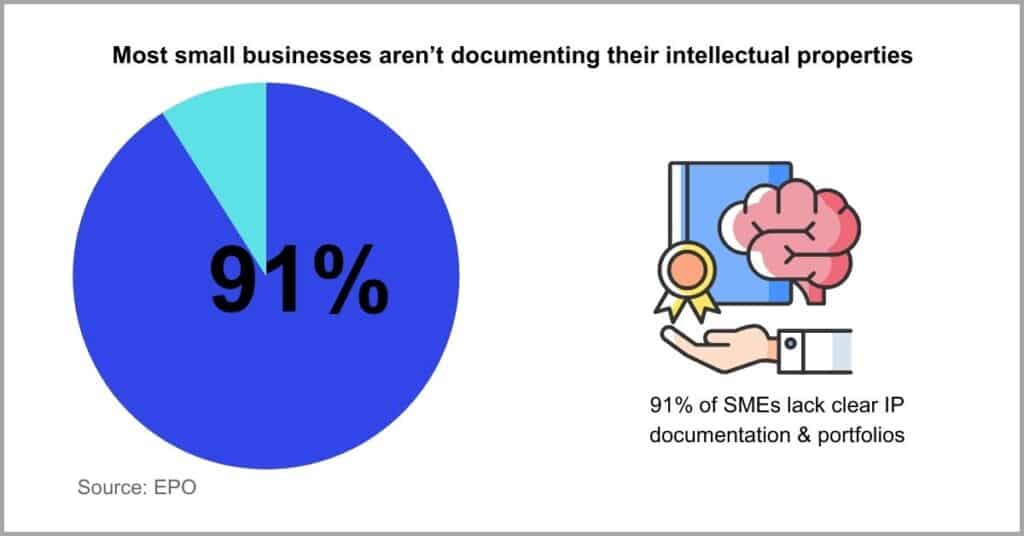
So what intellectual property documents should you create?
Some of the most common include patents, which you can obtain from national and international patent offices. You should also draft intellectual property agreements when loaning out intellectual properties to a third-party to avoid misuse and exploitation.
That said, having great visibility over your IP documents is also crucial, which is why I recommend using a document management tool to improve accessibility.
Click here to schedule a free FileCenter demo to learn more about our software.
We’ll explore how you can use our platform to make patent and intellectual property agreements searchable so that you can easily find & reference them during disputes.
8. Process documentation
What is process documentation and why is it important?
Process documentation refers to the act of maintaining clear records about a specific small business process, outlining step-by-step procedures of how to carry it out.
Unfortunately, you run the risk of creating an inconsistent and less productive workflow without process documentation to standardize various business tasks.
A study by BPTrends revealed that only 94% of businesses have documented at least 25% of their processes. While many of them recognized the importance of documenting these tasks, only a handful (2%) have implemented this strategy for all their processes.
So by creating important documents for small businesses like process documentation, you can gain a competitive advantage.
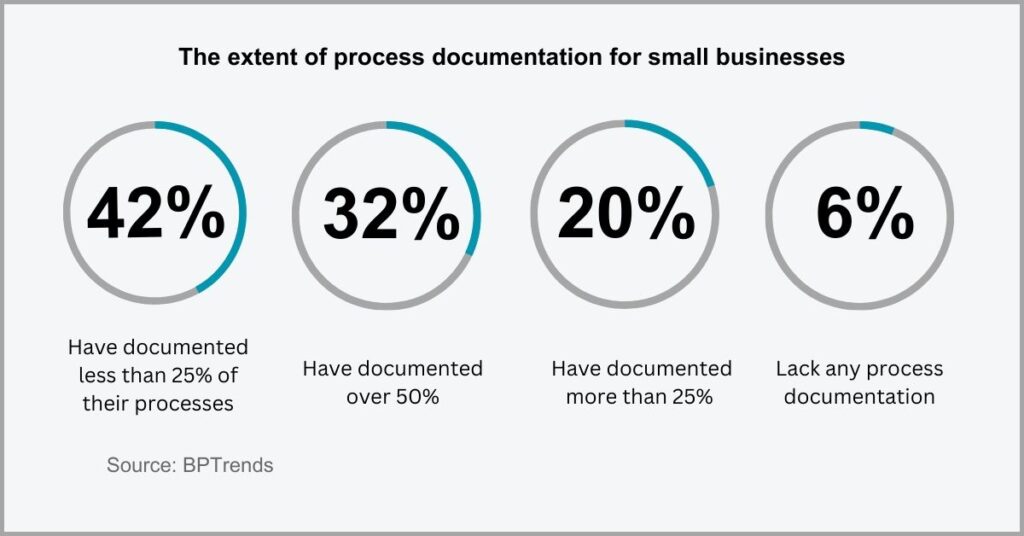
A great process document should break down the process into small and concise steps. For example, you can create a customer service protocol sheet defining the steps to follow when your agent is responding to a client issue.
It may break down the process into steps such as greeting and acknowledging the customer, asking pre-set questions to clarify the issue and then offering a pre-prescribed solution.
That said, you can create a different process flow document to guide each aspect of your workflow, including customer service, new employee onboarding & product development, among others.
Whatever the use case, this document helps to standardized business processes, ensuring consistent outcomes regardless of an employee’s skill level or experience.
9. Non-disclosure agreements
Non-dislourse agreements (NDAs) are sometimes necessary.
This is because your employees may need access to sensitive business information in order to carry out their job, which they can share with rivals and other third-parties.
Without an NDA to prevent staff from disclosing trade secrets and unique strategies, your small business can easily lose its competitive advantage.
A study by Statista revealed that 81% of companies experienced corporate espionage in 2024 that involved the theft of vital trade secrets. This represented a rise of about 9 percent from the previous year.
Well-drafted non disclosure agreements can help reduce cases of corporate espionage, in combination with other physical and digital security strategies.
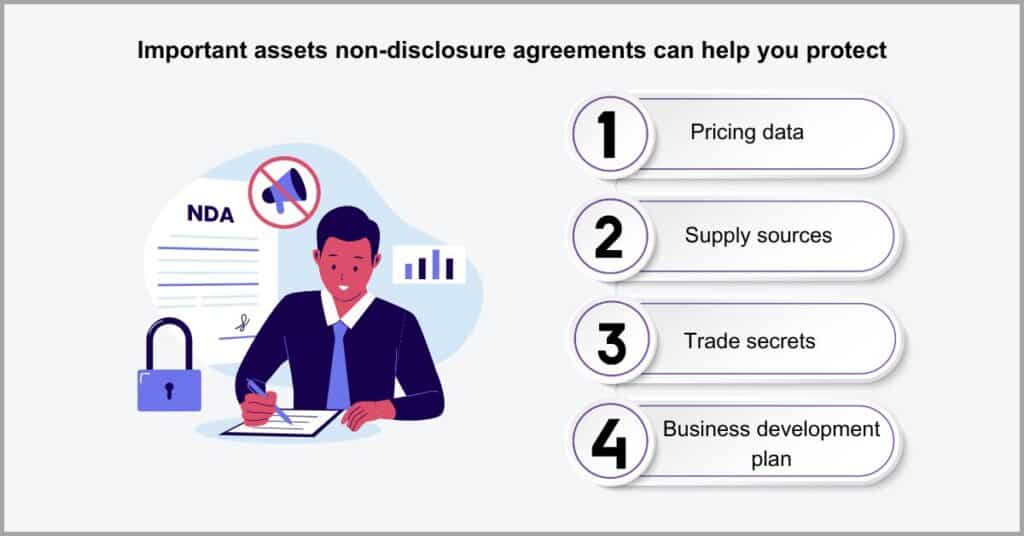
So what are the different types of NDAs available?
An employee non-disclosure agreement is very prevalent, and it’s one of the most important documents for small businesses that helps you safeguard trade secrets.
Another common type of NDA during legal document management is a company-contractor, non-disclosure agreement. This can help prevent partners and suppliers from sharing information about your pricing and sourcing strategy.
Both these documents fall under unilateral NDAs, where one party is under the obligation to share information or use this data within certain limitations.
Other primary types include bilateral & multilateral NDAs, which involve multiple parties or companies and are particularly crucial for streamlining mergers & acquisitions.
10. Compliance documentation
Your business has its compliance obligations.
These mandate the storage and maintenance of important compliance documentation, which show that your business operates in accordance with the law & industry policies.
Poor compliance documentation opens up various risks for your small business, chief among them being the difficulty to prove adherence to regulatory standards.
Alarmingly, at least 58% of small businesses struggle with regulatory compliance, according to a recent study by Regology. Most of the challenges emerge from two issues, namely the lack of compliance documentation and volatile regulations.
However, with a solid compliance documentation strategy in place, you make this aspect of your business more effortless & also keep up with regulatory changes easily.
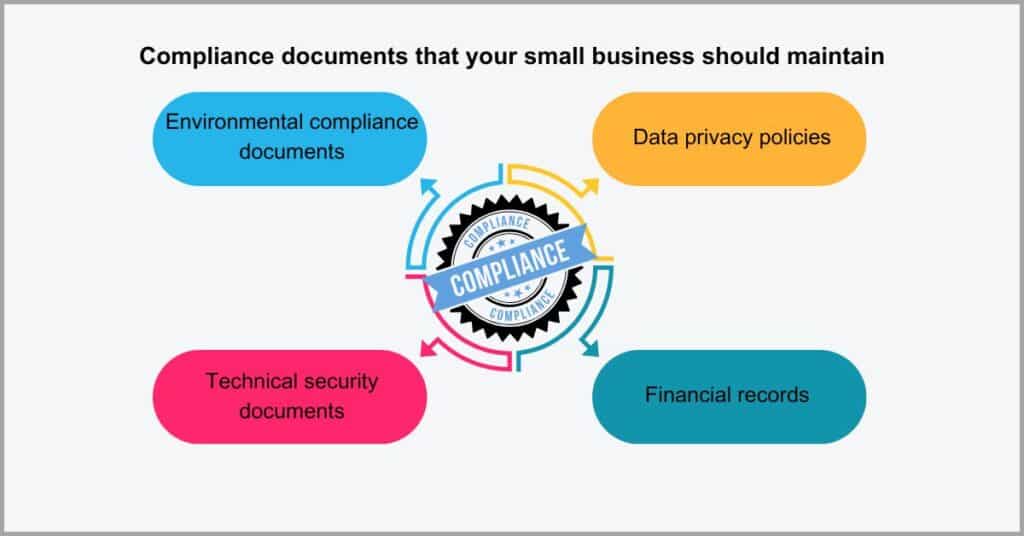
So what are some important compliance documents to keep?
They include the financial records and employee files we discussed earlier in addition to your official licenses and permits. It’s also vital to preserve other business records like environment compliance files, technical security documents & data privacy policies.
That said, I recommend using the best FileHold DMS alternatives to help you create a strong document retention policy for your small business. These solutions can maintain different versions of compliance documents, which is a vital regulatory requirement.
They’ll also make files much easier to find during your compliance audit processes, while making it simple to make policy changes to match volatile regulatory frameworks.
Conclusion
The right documents empower your business.
They improve staff productivity, enhance cash flow and enhance success overall.
That said, your small business needs to regularly create important documents to keep it running, which can distract from other revenue-driving tasks.
A study by M-Files discovered that businesses lose 21% of total productivity due to time wasted on iterative document work. These losses result from trying to find hidden files, recreating documents from scratch, and waiting on lengthy contract approvals.
If you’d like to streamline document work, I recommend considering an excellent document management solution. It can help to digitize important documents for small businesses and automate various tasks to increase efficiency.
Click here to start your free FileCenter trial to make your document processes more effortless and accurate.
You can use our software to streamline your document management workflow, allowing you to focus on growing your small businesses and generating more revenue.


